Dried mango has become an increasingly popular snack thanks to its sweet flavor and rich nutritional value. But many people still wonder: are the dried mango health benefits truly worth it, and how does it compare to fresh mango? In this article, we’ll explore the full nutritional profile, top health benefits, potential risks, a comparison with fresh mango, and practical tips on how to enjoy dried mango as part of a balanced diet.
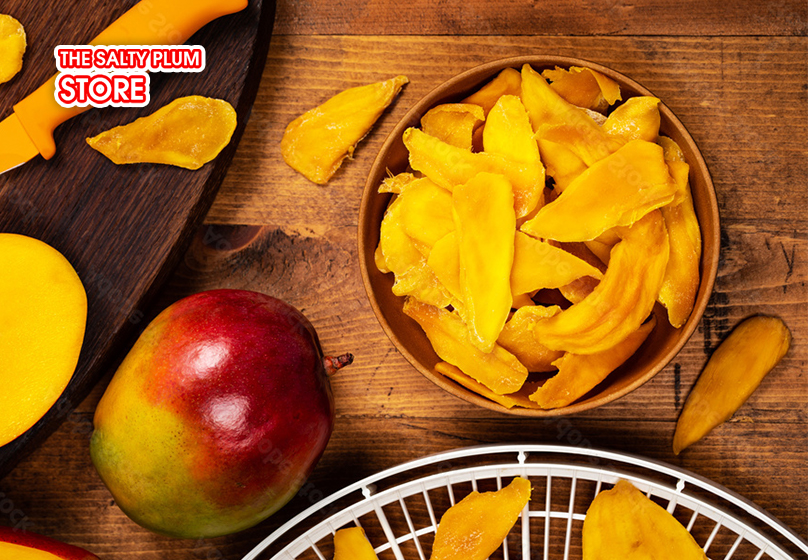
I. Nutritional Profile of Dried Mango
A standard 40-gram serving of dried mango (about 8–9 pieces) provides the following nutrients:
- Calories: ~128
- Carbohydrates: 31 g
- Fiber: 1–2 g
- Sugar: 27 g (naturally occurring, sometimes with added sugar depending on the brand)
- Protein: 1 g
- Vitamin C: 15–20% of the Daily Value (DV)
- Vitamin A: 3–5% DV
- Folate, Potassium, Magnesium, Calcium: present in moderate amounts
Key Highlights
- Rich in vitamins and antioxidants: Dried mango is a good source of vitamin C, vitamin A, beta-carotene, and polyphenols, which act as powerful antioxidants to protect the body from oxidative stress.
- Quick energy source: Its natural sugars make it an excellent pick-me-up for athletes and active individuals.
- Supports digestion and weight management: The dietary fiber helps regulate bowel movements, promote gut health, and keep you feeling fuller for longer.
Limitations
- High in sugar and calories: Overeating can lead to weight gain or spikes in blood sugar.
- Reduced vitamin C levels: Since vitamin C is heat-sensitive, some of it is lost during the drying process compared to fresh mango.
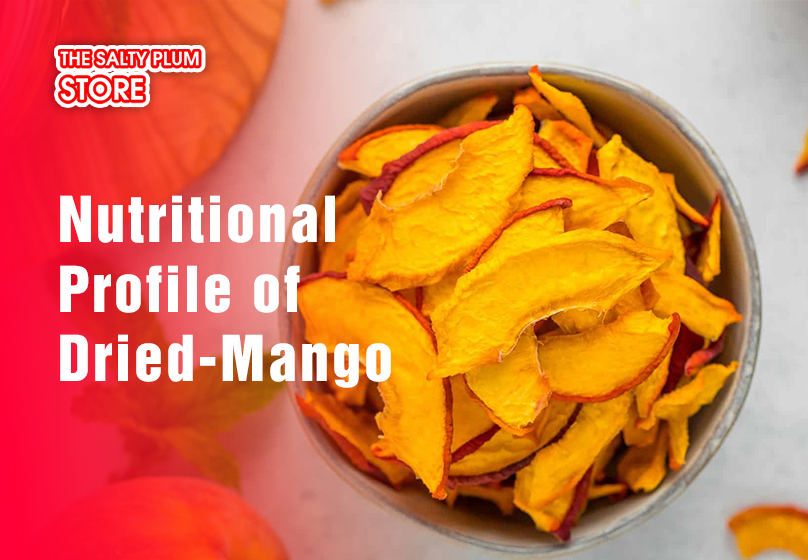
II. Top Health Benefits of Dried Mango
Dried mango isn’t just a tasty treat—it comes with a wide range of health benefits when enjoyed in moderation. Here are some of the most notable dried mango health benefits:
- Boosts Immune System: Packed with vitamin C and carotenoids, dried mango strengthens your immune defenses, helping your body fight off infections and illnesses more effectively.
- Supports Digestion: Rich in dietary fiber, dried mango promotes healthy digestion by regulating bowel movements and preventing constipation. A healthy gut microbiome also benefits from fiber intake..
- Enhances Skin and Eye Health: With vitamin A, vitamin E, and antioxidants, dried mango protects against oxidative stress, supports healthy vision, and promotes glowing, youthful-looking skin.
- Provides a Natural Energy Boost: The natural carbohydrates and sugars in dried mango provide a quick energy source, making it a perfect snack for athletes, students, or anyone with an active lifestyle.
- Supports Bone Health: Containing vitamin K, calcium, and phosphorus, dried mango helps maintain strong bones and may lower the risk of osteoporosis over time.
- Aids in Weight Management: When eaten in controlled portions, dried mango can replace less healthy snacks like chips or candies. It satisfies sweet cravings while offering valuable nutrients, making it a smarter choice for weight management.
- Improves Heart Health: The potassium content helps balance blood pressure, while fiber supports healthy cholesterol levels, reducing the risk of cardiovascular diseases
👉 Discover premium dried mango at The Salty Plum Store – delicious, nutritious, and perfect for your healthy snacking!
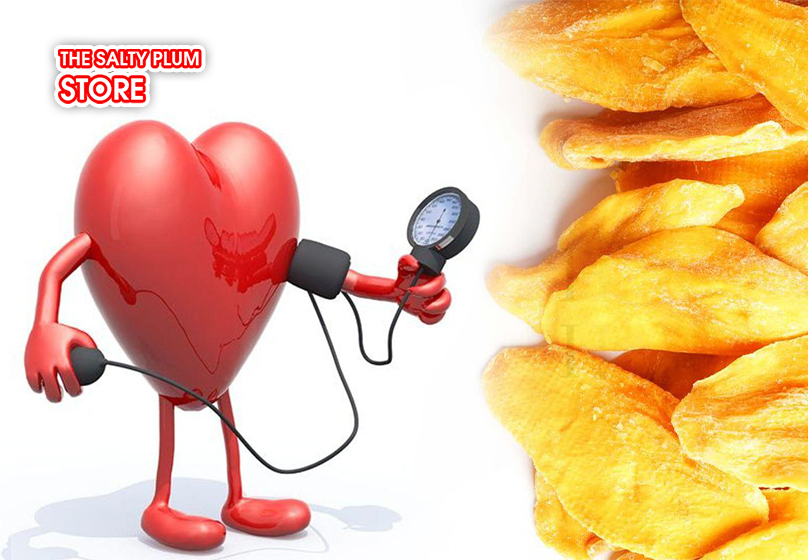
III. Potential Risks and Considerations
While dried mango offers many health benefits, it also comes with certain risks if consumed in excess or chosen carelessly. Here are some key points to keep in mind:
1. High Sugar Content
Dried mango is calorie-dense and naturally high in sugar. Overeating can spike blood sugar levels and contribute to weight gain. People with diabetes or those monitoring their sugar intake should be especially cautious.
2. Possible Allergic Reactions
Some individuals may be sensitive to profilin, a compound linked to cross-reactivity with fruits like apples, pears, and peaches. Others may react to urushiol, a substance found in mango skin that can trigger irritation in people previously exposed to poison ivy or poison oak.
3. Preservatives and Additives
Commercial brands sometimes add sulfites (such as sulfur dioxide or potassium metabisulfite) to extend shelf life and preserve color. These additives can cause breathing difficulties or allergic reactions in people with asthma or sulfite sensitivity.
4. Lower Vitamin C Than Fresh Mango
Since vitamin C is heat-sensitive, the drying process reduces its levels significantly compared to fresh mango. This makes dried mango less effective for boosting immunity if eaten as the sole fruit source.
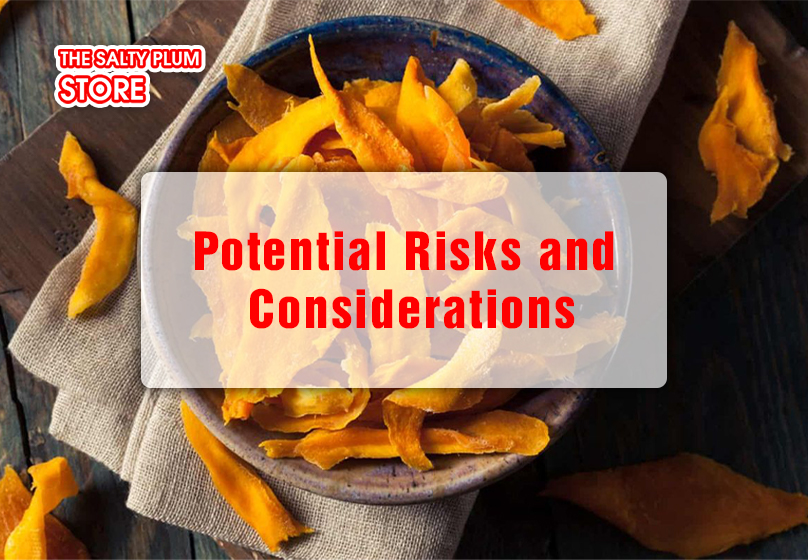
5. Smart Consumption Tips
- Choose unsweetened dried mango without added sugars or syrups.
- Avoid products with sulfites or artificial preservatives.
- Stick to a portion size of about 30–40 grams per day (a small handful) to enjoy the benefits without the drawbacks.
IV. Comparison With Fresh Mango
Both dried mango and fresh mango come with their own unique advantages. Understanding the differences can help you decide which option best fits your dietary needs.
1. Fresh Mango
- Lower in calories: Fresh mango is high in water content, making it less calorie-dense than dried mango.
- Higher in vitamin C: Because no heat is involved, fresh mango retains more vitamin C, which supports immunity and skin health.
- More filling: The water and fiber content in fresh mango helps you feel full longer, making it a great choice for weight control.
2. Dried Mango
- Nutrient-dense: With water removed, nutrients like carbohydrates, fiber, and minerals are more concentrated.
- Convenient and long-lasting: Easy to store and carry, dried mango is perfect for on-the-go snacking.
- Intense flavor: Its chewy texture and sweet taste make it a versatile ingredient for trail mix, yogurt toppings, or baking.
3. Bottom Line
Both fresh and dried mango are healthy choices, but they serve different purposes. Fresh mango is ideal for boosting vitamin intake and managing calories, while dried mango is a convenient, nutrient-packed snack that offers quick energy and portability.
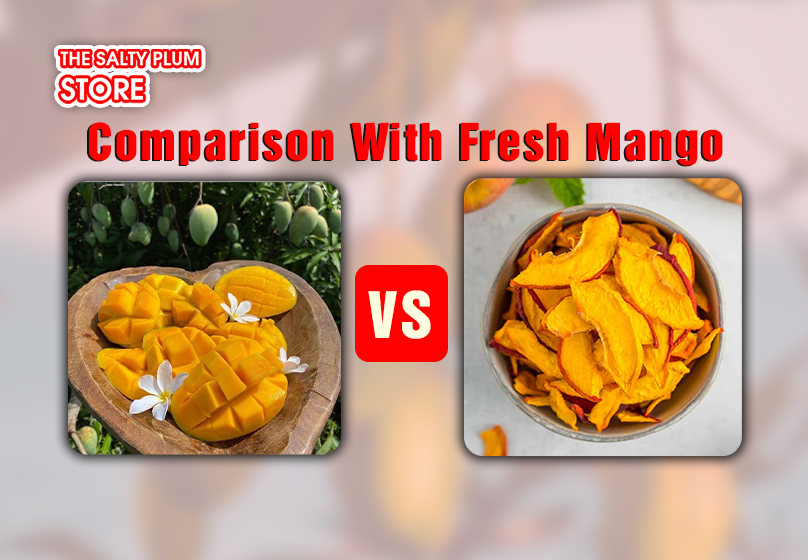
V. Conclusion
Dried mango health benefits include boosting immunity, supporting digestion, promoting heart health, and protecting your skin and eyes—all while providing a quick source of natural energy. Its concentrated nutrients make it a convenient and delicious snack option.
That said, dried mango is also high in natural sugars and calories, so moderation is key. To maximize health benefits, choose unsweetened, preservative-free dried mango and enjoy it in reasonable portions. By doing so, you can savor its sweet flavor while nourishing your body in a balanced way.
